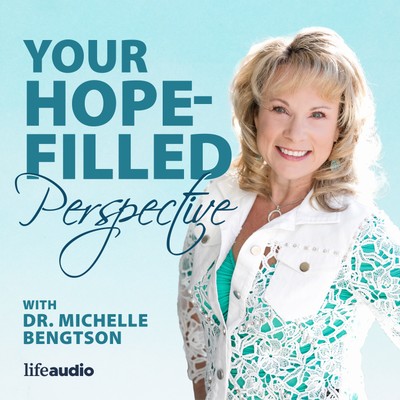
Your Hope-Filled Perspective with Dr. Michelle Bengtson podcast
Dr. Michelle BengtsonHow To Overcome Burnout with Faith-Based Strategies for a Healthier, Happier Life
April 10, 2025 ● 30 minShare this episode
Episode Summary:
A recent survey of 15,000 workers across 15 countries found that a quarter of all workers experienced burnout symptoms, but many don’t recognize it for what it is until after the crash has occurred. Join me with Dr. Jonathan Hoover, author of Stress Fracture: Your Ultimate Guide to Beating Burnout.
Together, we will unpack the root causes of burnout and explore how it impacts physical, emotional, and spiritual well-being. Dr. Hoover shares actionable strategies and faith-based insights for recognizing stress fractures in life and taking steps to heal holistically. With practical advice, scientific understanding, and a focus on hope, this episode will equip you to overcome burnout and restore balance, resilience, and joy.
Quotables from the episode:
- We can go from being okay to not being okay really quickly.
- Burnout is a legitimate path straight to depression.
- I found out that it’s (burnout) not a unique situation. It happens a lot, and especially even to people that we would look up to as incredibly productive people.
- It is very, very common, especially amongst highly productive individuals, because we have a tendency to even push through our body's normal signals that, hey, you need a rest. We kind of push through and go, I'll take time for a rest after I get this done, after I get that done and we don't take the time. But I think what is hard and your example of your father's experience is that often we don't see the early signs of burnout and we don't recognize it for what it is until after we've hit rock bottom.
- Burnout specifically tends to happen to people that are very driven. And we want to do lots of things and we want to take on the world and we dream big and we execute big. But sometimes we execute beyond what God is calling us to do. And we have to grieve the fact that there are lots of good things we could do but Paul taught us that not everything I could do is something I should do.
- There is something about the emotions we experience that are at the core of who we are as a person. And we sort of use that emotional capital in understanding how other people feel, sharing with them how we feel, using our emotions to achieve goals, exercising our emotions to be Christ -like. I mean, tells us about Jesus' emotion. So often we see that Jesus was compassionate. That is an emotion. And there is a season where Jesus wants to get off by himself because there wasn't even enough time for them to eat. Him and his disciples didn't even have enough time to eat. But what you see is that what was he tired of doing? He was giving of himself emotionally. There was this compassion, there was the desire to help people who were struggling. And we don't realize in our daily life how much emotional capital we are doling out from our emotional wallet.
- When it comes to caring about our kids, caring about our spouse, caring about our job, putting our passion and energy into our life's calling and At some point what can happen is we can write those emotional checks beyond what the balance is in the account That's what happens with burnout is and that's why it can start with such a benevolent and well-meaning direction in life. I want to give as much of myself as I can to as many people as I possibly can I want to accomplish big things, nothing wrong with any of that, until we write a check that's bigger than the balance. And then what happens is, this is something that we're still trying to figure out psychologically. There is a sort of, of last straw that happens with emotions. We haven't figured it out yet, but you go from being okay to not being okay very fast, very fast. And that is I think what is so challenging when you work with people as I do who are burned out is one day they're doing fine, and then the next day they're not.
- I like to treat the analog of going to the gym as a good way of thinking about burnout. So if I'm going to the gym and I'm hurting myself because I'm pushing myself beyond my limits. So let's say I go and I try to lift too much weight or something like that. I have three options for how to deal with it. I could, one, reduce the weight that I'm lifting. So sometimes when I work with people who are burned out, my first suggestion is let's try to figure out what we can delegate that you do. Let's figure out how to get you doing what only you can do and find a way to get people, other people to help you do what other people could do.
- Sometimes I have to work with people to say, well, the reason it's so difficult for you is it has to be perfect. Perfectionists tend to get burned out faster than anybody else. So we have to learn that science of good enough.
- Burnout can happen in a lot of arenas. It can happen in marriage. It doesn't have to be work. But whatever arena I'm burning out in, the question is, am I doing healthy things away from that arena to help me fight that more challenging battle in that one zone?
- Signs that you’re potentially facing burnout are massive exhaustion.
- There’s a difference between being exhausted and being tired. Tired is normal. Tired helps me know I need to rest. The difference between being tired and being exhausted is like when you’re driving down the road and the little gas light comes on, that's tired. If you are on the side of the road and literally your car won't start because there's no gas in it, that's exhausted. So there's a big difference between saying, "I really should rest," and saying, "I have nothing left to give anyone." That's exhaustion. When you start to feel like, "I don't have anything to give anybody," huge sign there, a burnout.
- So there are a lot of things that people wouldn't necessarily immediately tie to burnout that absolutely can be related. Digestive issues can be related to burnout, migraine headaches, shoulder and neck tension.
- Anything that ends in itis, pick up a medical manual when you're at your bookstore, look for anything that ends in itis. That is a bodily inflammation illness of some sort. Some, if it ends in itis, inflammation is at the root of it. And we know that stress causes bodily inflammation. So I make myself more likely to have those itis conditions by allowing stress to get out of hand.
- There are some cognitive things to look for. Burnout effects are working memory. So you have that kind of memory thing where it's sort of like a whiteboard. You can throw some numbers up there, an idea up there, but you don't need it long. You just need it for a second. And we have that in our memory where we can just hold something briefly. And when we're stressed out, that takes a huge hit. I mean, all of us have that experience where you're walking down the hallway and you're like, wait, what did I, what was I doing? Like, why did I come down this hallway? We all have that. But if it happens three or four times more than usual, so you constantly, like all the time, you're finding yourself going, well, I was thinking about something and I lost my train of thought. I was trying to walk down here. I forgot what I was going for. And you just realize, like, I don't remember things nearly as well as I normally do. That's a sign.
- Listen to people that love you. That's a big one. So when your spouse says, I'm worried about you, don't let that just roll off. Pay attention, right? And know that they care about you. The first thing I always tell anybody who's really thinking “I'm going through burnout” is you need to make three appointments. Just do it now. Just do it now. First appointment needs to be with your doctor. Get with your primary care physician, set up an appointment to go see them, get a checkup, let them know any symptoms you might be experiencing, physical symptoms, let them know that you're going through a season of stress. Have them check you out physically. Make an appointment with a therapist. Sit down with a counselor, a professional counselor, walk through what it is that you're going through. And then finally, make an appointment with a spiritual advisor. That could be your pastor to talk about your spiritual condition.
Scripture References:
- Mark 4:38 “Jesus was sleeping at the back of the boat with his head on a cushion. The disciples woke him up, shouting, “Teacher, don’t you care that we’re going to drown?”
Recommended Resources:
- Stress Fracture: Your Ultimate Guide to Beating Burnout by Jonathan Hoover, Ph.D.
- Sacred Scars: Resting in God’s Promise That Your Past Is Not Wasted by Dr. Michelle Bengtson
- The Hem of His Garment: Reaching Out To God When Pain Overwhelms by Dr. Michelle Bengtson, winner AWSA 2024 Golden Scroll Christian Living Book of the Year and the 2024 Christian Literary Awards Reader’s Choice Award in the Christian Living and Non-Fiction categories
- YouVersion 5-Day Devotional Reaching Out To God When Pain Overwhelms
- Today is Going to be a Good Day: 90 Promises from God to Start Your Day Off Right by Dr. Michelle Bengtson, AWSA Member of the Year, winner of the AWSA 2023 Inspirational Gift Book of the Year Award, the 2024 Christian Literary Awards Reader’s Choice Award in the Devotional category, the 2023 Christian Literary Awards Reader’s Choice Award in four categories, and the Christian Literary Awards Henri Award for Devotionals
- YouVersion Devotional, Today is Going to be a Good Day version 1
- YouVersion Devotional, Today is Going to be a Good Day version 2
- Revive & Thrive Women’s Online Conference
- Revive & Thrive Summit 2
- Trusting God through Cancer Summit 1
- Trusting God through Cancer Summit 2
- Breaking Anxiety’s Grip: How to Reclaim the Peace God Promises by Dr. Michelle Bengtson, winner of the AWSA 2020 Best Christian Living Book First Place, the first place winner for the Best Christian Living Book, the 2020 Carolina Christian Writer’s Conference Contest winner for nonfiction, and winner of the 2021 Christian Literary Award’s Reader’s Choice Award in all four categories for which it was nominated (Non-Fiction Victorious Living, Christian Living Day By Day, Inspirational Breaking Free and Testimonial Justified by Grace categories.)
- YouVersion Bible Reading Plan for Breaking Anxiety’s Grip
- Breaking Anxiety’s Grip Free Study Guide
- Free PDF Resource: How to Fight Fearful/Anxious Thoughts and Win
- Hope Prevails: Insights from a Doctor’s Personal Journey Through Depression by Dr. Michelle Bengtson, winner of the Christian Literary Award Henri and Reader’s Choice Award
- Hope Prevails Bible Study by Dr. Michelle Bengtson, winner of the Christian Literary Award Reader’s Choice Award
- Free Webinar: Help for When You’re Feeling Blue
Social Media Links for Host and Guest:
Connect with Dr. Jonathan Hoover:
Website / Facebook / LinkedIn / Instagram
For more hope, stay connected with Dr. Bengtson at:
Order Book Sacred Scars / Order Book The Hem of His Garment / Order Book Today is Going to be a Good Day / Order Book Breaking Anxiety’s Grip / Order Book Hope Prevails / Website / Blog / Facebook / Twitter (@DrMBengtson) / LinkedIn / Instagram / Pinterest / YouTube / Podcast on Apple
Guest:
Dr. Jonathan Hoover serves as the senior associate pastor of NewSpring Church in Wichita, Kansas. He also works as an assistant professor at Regent University’s School of Psychology and Counseling, where he is the director of the master of science in psychology program. He lives in Wichita, Kansas, with his wife, Wendy, and daughters, Cheyenne and Summer.
Hosted By: Dr. Michelle Bengtson
Audio Technical Support: Bryce Bengtson
Discover more Christian podcasts at lifeaudio.com and inquire about advertising opportunities at lifeaudio.com/contact-us.
Today's Devotional
A Prayer to Walk in God’s Love on Valentine’s Day - Your Daily Prayer - February 14
Valentine’s Day can highlight what’s missing, but God’s love never leaves. This devotional invites us to choose love that lasts, every day.
Top Artists
Top Music Videos

Chris Tomlin Chris Tomlin - Holy Forever

Chris Tomlin Chris Tomlin’s Powerful Live Rendition of ‘The First Hymn’ Will Stir Your Soul

chris rupp When the Saints Go Marching In - Chris Rupp A cappella ft. Deke Sharon and Jeff Thacher

Universal Music Group Women Who Worship - Thank You Jesus For The Blood

toby mac TobyMac Unveils ‘Heaven on My Mind’ Lyric Video










